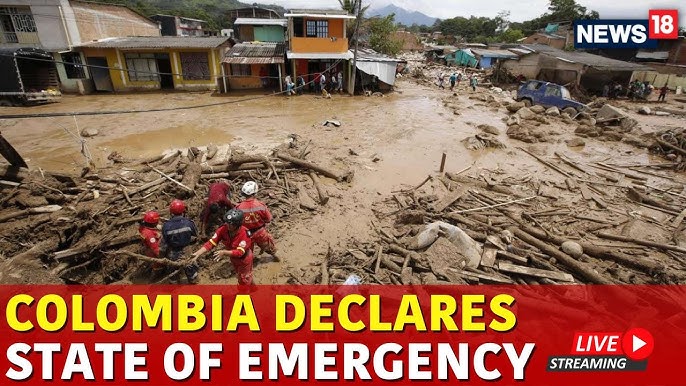Extreme rainfall came to Colombia in early November 2024, bringing catastrophic flooding that displaced 90,000 people. In Bogota, the capital city, flooding in the northern sector left students stranded inside schools and travelers stuck on the highway. Hailstorms damaged agriculture in the departments of Boyacá, Santander, and Norte de Santander, and 10,000 families were displaced in the country’s northernmost region of La Guajira.
The damage was most acute in the country’s west, where more than 85% of the Pacific Ocean–bordering Chocó department was affected by the flooding as the Atrato River inundated communities. According to official reports, 50,000 families in Chocó alone were displaced. The devastation was so great that, following the flooding, Chocó’s governor declared a six-month state of calamity.
Extreme Weather Batters an Already Vulnerable Region
The extreme weather, which experts say is being exacerbated by climate change, hit a region that was already vulnerable. Chocó’s people are among the country’s poorest. Most are Indigenous or Afro-Colombian and as such, face racism and discriminatory policies. In addition, Chocó’s rugged mountain geography and thick tropical jungle have prevented the development of transportation infrastructure, isolating the region from much of the rest of Colombia. In this remote area, many people have no access to running water, sanitary sewers, or modern healthcare.
Armed guerillas have long had a presence in the area, jockeying for power and trying to gain territory in the illegal trade of drugs and precious metals like gold and platinum. The ongoing conflict contributes to Chocó’s poverty. In the aftermath of the November 2024 floods, armed guerillas took control of the rivers, restricting travel on them.
In response, the head of Colombia’s National Disaster Risk Management Unit urged the guerillas to allow for delivery of relief supplies. Among the groups that stepped in to provide emergency relief was Islamic Relief USA (IRUSA). In recent years, the nonprofit has expanded its humanitarian aid and emergency relief efforts to Latin America, starting with its response to the catastrophic January 2010 earthquake that rocked Haiti.
IRUSA’s Disaster Management Team Deploys to Colombia
Following the November 2024 flooding in Colombia, IRUSA deployed its Disaster Management Team (DMT) to Chocó. Their first priority was evaluating the needs of displaced residents. According to Hani Hamwi, DMT manager, many of Chocó’s residents live off the land, particularly by growing bananas. Tragically, the flooding destroyed entire crops, robbing the residents of their livelihood in the process. Homes were also destroyed, some pushed off their foundations, and with the guerillas further limiting the land to which residents could flee, many were forced to seek refuge in dangerous, uninhabitable areas. Sanitation was also a major concern. Floodwater can contain sewage, pollution, agricultural chemicals, bacteria, and other disease-carrying pathogens.
Reaching some remote communities in Chocó required a three-hour boat ride for IRUSA’s DMT, as roads were impassable. However, the team succeeded in reaching 300 vulnerable families, providing them with packages of food as well as hygiene kits designed to help people stay clean and prevent health risks.
IRUSA, whose personnel also met with Chocó’s governor during the relief mission, was able to offer this relief thanks to the support of its donors.
IRUSA’s History in Latin America
Following the 2010 earthquake in Haiti, where IRUSA provided on-the-ground aid to survivors as well as sought to find long-term development solutions, IRUSA has responded to disasters across Latin America. In 2016, a 7.8-magnitute earthquake hit Ecuador, leaving widespread devastation in its wake. IRUSA responded by partnering with Catholic Relief Services to collaborate on an integrated emergency relief project.
IRUSA responded to another earthquake the following year in Mexico, providing relief to people in the capital city. The day after the 7.1-magnitude earthquake, Hurricane Maria crashed into Puerto Rico, eventually causing nearly 3,000 deaths on the island and over $91 billion in damage. In Maria’s immediate wake, IRUSA, working with partners, provided on-the-ground relief in the form of water, food, and money. In June, thanks to generous donations from IRUSA supporters, the nonprofit returned to Puerto Rico, collaborating with Lions Club International to provide assistance to people affected by the disaster.
Other IRUSA efforts in Latin America have included playing a key role in distributing meals to 5,000 refugees from Venezuela entering Cúcuta, Colombia, in 2018. The following year, IRUSA delivered aid in Peru by improving shelter and community kitchens for 8,000 refugees. Beds, furniture, equipment, utensils, and cleaning supplies were provided.
Back in Colombia, Hani Hamwi says that assisting the people of Chocó is an “immense honor,” and that providing relief and development in the region is a priority for IRUSA. To learn more about these efforts and watch a video of the DMT on the ground in Chocó, see irusa.org/latin-america.

Leave a Reply